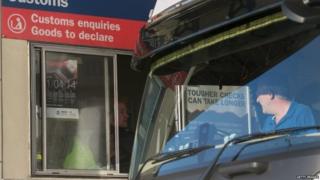 Image copyright
Getty Images
Image copyright
Getty Images
Theresa May is facing the possibility of a fresh challenge to her Brexit authority in a series of votes later.
Brexit-backing MPs have tabled four amendments to legislation for a new customs regime after the UK leaves.
One could stop the UK from collecting tariffs for the EU, part of her plan for future relations with the bloc.
The BBC understands ministers may back three of them, on Northern Ireland's post-Brexit status, the UK being out of the EU's VAT regime and Commons powers.
It is unclear what will happen to the most controversial amendment - a call for the UK not to collect tariffs on goods bound for the EU unless there are reciprocal arrangements in place across the continent.
The UK is due to leave the EU on 29 March 2019 and Parliament is considering a number of new laws needed to prepare for this and for life after the end of a proposed transition period, which is scheduled to last up to December 2020.
The tariff plan is a key part of Theresa May's proposal for a free trade zone for goods moving between the UK and the EU, underpinned by a "common rule book", after the UK leaves.
This negotiating position, agreed by the cabinet at Chequers, has angered many Tory MPs and Monday's votes on the Taxation (Cross Border Trade) Bill are among several over the coming days which could see them mounting a show of strength.
With Labour set to vote against the legislation at its final parliamentary stage, it would only take a handful of Tory MPs to side with them for the bill to fall.
The BBC's assistant editor Norman Smith said any climbdown by Downing Street under pressure from those who want a clean break with the EU after Brexit will worry former Remainers who want the UK to retain the closest possible ties.
Asked whether the government was set to back down in order to avert a potential rebellion, Business Secretary Greg Clark emphasised the importance of getting the legislation in place.
"The amendments are to a bill that is designed to prepare for the world after Brexit, to be able to establish a new customs regime that will be necessary," he said.
"So I would hope and expect that those of my colleagues that want to get on with Brexit would recognise that this Bill is essential."
The amendments are backed by the European Research Group of MPs, whose chairman, Jacob Rees-Mogg, has insisted they want to force Mrs May to change course rather than topple the prime minister.
He has said they are designed to:
- Enshrine in law the government's commitment that Northern Ireland should be treated the same way as the rest of the country and not become a separate customs territory
- Ensure reciprocity of customs collections, treating the UK and EU as equals
- Enshrine in law the UK's commitments that it will not be part of the EU's harmonised VAT regime
- Require any new customs union with the EU only come into force if passed by Parliament through primary, rather than, secondary legislation
The Sun reported that the amendment on tariff collection could be dropped by Tory MPs should the government agree to their other demands.
Former Brexit Secretary David Davis, who quit his post last week, said he would be backing the amendments on Northern Ireland and the customs union as they were already government policy and "would do no harm putting it into the bill".
Mr Davis could speak during the Commons debate, expected to start after 17:00 BST - which would be his first Parliamentary intervention since his departure a week ago.
But he said he still backed Theresa May, telling reporters as he left his London home that "my name's not Geoffrey Howe" - a reference to the late Conservative politician whose barbed criticisms of Margaret Thatcher during his resignation speech in 1990 paved the way for her subsequent downfall.
Mrs May is facing dissent both from Conservative MPs who voted to leave and remain in the 2016 referendum over her blueprint for the UK's future relations with the EU.
Scott Mann became the latest Tory MP to stand down as a ministerial aide to the Treasury in protest at the PM's plan, following Robert Courts who did the same on Sunday.
Former education secretary Justine Greening said the plan was the "worst of both worlds" as she became the most senior Tory politician to call for another referendum on the final deal to break the current "deadlock".
Mr Clark, the business secretary, said he disagreed with his colleague and believed the Chequers plan was the best way forward.
Urging the EU to respond positively to the UK's proposals, he said an agreement this autumn, if it was backed by Parliament, would bring "certainty for working people right across the country".